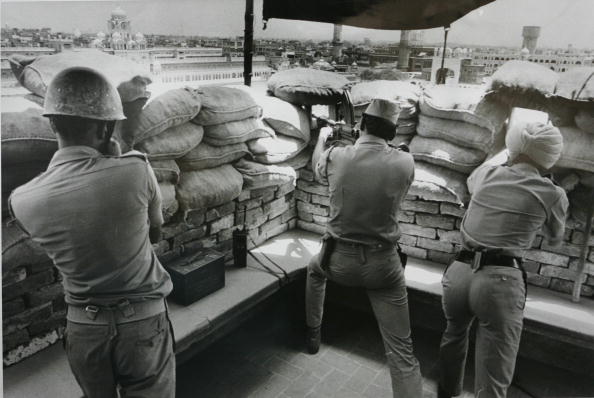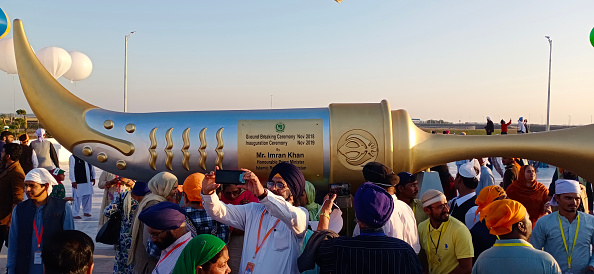Sikhs only comprise less than 2 percent of the Indian population, despite their small population they have also been the subject of sectarian issues and violence. Moreover, there has been a recent resurgence of the Khalistan movement which calls for the establishment of a separate Sikh state in Punjab. Nevertheless, the movement witnessed its peak in the 1980s, when the Indian army conducted Operation Blue Star to remove militant Sikh separatist Jarnail Singh Bhindranwale from the Golden Temple complex in Punjab. The operation subsequently damaged the Akal Takht one of the holiest sites for Sikhs. Shortly following the incident, two of then Prime Minister Indira Gandhi's Sikh guards murdered her, which resulted in mass anti-Sikh riots leading to the deaths of thousands of Sikhs in India. While the Khalistan movement started to wane by the 1990s, it experienced a slight resurgence in recent years as prominent members of the movement have called for a referendum to take place next year in Punjab, where Sikhs will be asked to vote on whether or not a separate Sikh state should be established there.
While it is not yet clear how much voter turnout the referendum will yield, there is evidence to suggest that Pakistan’s rogue intelligence agency, the Inter-Services Intelligence (ISI), is supporting the calls for referendum as well as supporting radical Sikh activists residing in India and foreign countries, particularly Canada and the United Kingdom. What’s more pressing is the ISI’s training and funding of radical Sikh terrorists seeking to carry out attacks on Indian state agencies in Punjab.

ISI’S OPERATIONS TO DESTABILIZE INDIA
One of the ISI’s pillars since its establishment in 1948 is destabilizing the Indian state. The ISI’s activities in India range from state-sponsored terror attacks, training and recruiting militias bent on undermining the Indian state apparatus and training and supporting radical separatists in Kashmir and Jammu and Punjab. Among the major terror attacks that are widely believed to be sponsored by the ISI are the 1993 Mumbai Blasts and the 2008 Mumbai attacks. The latter attack was done by the Lashkar-e-Taiba militant, Zabiuddin Ansari, and Lashkar-e-Taiba is one of the Kashmir based terror organizations which the ISI and the Pakistani army recruits and trains its insurgents.
Jammu and Kashmir have been the one region that the ISI has worked extensively on, and as a result, it became a breeding ground for both homegrown and foreign-sponsored terror groups. For decades, the Pakistani government’s support for Kashmiri jihadist groups posed a great threat to India’s sovereignty, the fact that a lot of the training and recruitment took place in Pakistan-administered Kashmir made the prospect of an attack even greater. In 2002, shortly after the 9/11 attacks, then Pakistani president Pervez Musharraf sought to ban all militant groups operating in his country, and for a brief time, his battle against terrorist groups seemed to be working. He even sought to reduce Pakistan’s support for militant groups attacking Indian Kashmir. According to a BBC report, his efforts were briefly successful as by 2005, the Kashmiri militancy had almost completely stopped. However, the late 2000s saw a resurgence of Kashmiri insurgency and Pakistani support for jihadist groups.
As previously stated, Lashkar-e-Taiba (LeT) is one of the major terror groups in the region and one of its main objectives is to integrate Indian Kashmir into Pakistan. Pakistan's support for the terrorist group is extensive, back in 2011 David Headley, a Pakistani-American member of the group was captured by Indian authorities. After his capture he revealed a number of ways the ISI has been aiding the group, he stated that each vital member of the LeT (leaders, spies…etc) gets one ISI agent to sponsor them. As a surveillance agent for the LeT, he had an ISI partner who provided 25,000 US dollars in funds to carry out spying operations in India.
Shortly after India’s decision to revoke Article 370, the ISI’s operations in Jammu and Kashmir only intensified. A recent 45-minute investigative report by India Today revealed that the ISI has expanded its recruitment network by recruiting operatives from a myriad of countries such as Canada and Nepal in order to infiltrate Jammu and Kashmir. The report conducted a secret interview with an ISI recruiter, who stated that some of the recruitment also happens within India, especially within a New Delhi inn popular among Pakistani diplomats.
ISI’S SUPPORT FOR KHALISTANI RADICALS
The ISI’s support for Kashmiri jihadist groups is well documented, however, its support for Khalistani groups is much less known. According to an article in the Fair Observer, the ISI’s support for the Khalistan movement dates back to the 1970s and 1980s, the period in which the movement was at its peak strength and posed a major threat to the unity of India. Furthermore, it was during this time period in which insurgency in Punjab was frequent, according to the same article in the Fair Observer, violence in Punjab between 1980 and 2000 cost the lives of 11,694 Indians. While it is not clear why the ISI started supporting the movement some believe it is revenge for India’s support for Bangladesh (then East Pakistan) in its 1971 war of independence from Pakistan. Despite the fact that the war had ended almost 50 years ago, Khalistani leaders are still using it to propagate Pakistani support for its movement. Last year, the US-based Sikhs For Justice organization wrote to Pakistan’s leader Imran Khan asking for his government’s support for the planned 2020 Khalistan referendum, and the letter allegedly stated that Punjab’s liberation would be Islamabad’s way of avenging “the fall of Dhaka”. Thus far, it is still not clear whether or not the current Pakistani government supports the movement; however its intelligence apparatus, which has undermined the Pakistani government on a number of occasions, certainly does. One thing is for certain though; Pakistani government’s support for the movement is in compliance with the ISI’s wider goal of destabilizing the Indian state.
THE ISI AND THE SIKH DIASPORA
While calls for Sikh separatism died down in Punjab since the 1990s, Sikh extremist groups are still operating in a number of Western countries, particularly the UK, Canada, and the US. Babbar Khalasa International (BKI) is one of the said groups that operate in the West despite the fact that it is classified as a terrorist organization in most Western states and India. BKI’s objective is to create a separate Sikh state in Punjab through the use of violence, and its most famous terrorist attack was its 1985 bombing of an Air India Boeing 747 en route to India, the attack would the lives of 329 people and remained the most deadly aviation terrorist attack until 9/11. Many of these extremist groups have more leeway to operate in Western countries with more permissive political climates. Indian intelligence has reason to believe that the ISI has been and is still aiding and abetting such groups abroad. In a 2018 interview with Outlook India, Punjab Chief Minister Amarinder Singh explained that the ISI is exploiting the Sikh diaspora living in the West to revive the Khalistani sentiment and that most foreign-based Khalastani movements are either working closely with the ISI or working independently. Moreover, the ISI has played a role in most of the recent terror attacks in Punjab.
REVIVAL OF PUNJABI INSURGENCY
This decade is coming to a close, and people of the Indian subcontinent will remember it for a number of reasons, such as the rise of Narendra Modi and the BJP, the border skirmishes between India and Pakistan and the resurgence of Khalistani militancy both within India and outside India. One of the first major incidents happened in 2012 when a group of extremist Sikhs stabbed Lt-Gen Kuldeep Singh Brar, the general who led Operation Blue Star in 1984, in Oxford Circus in London. Brar survived the attack, and the assailants were found and arrested a year later. The following years saw more unrest in Punjab, as 2016 saw six terrorist incidents, many of which were targeting Hindu nationalist leaders. Last year, extremist Sikhs threw grenades at the Nirankari temple in Ameristar; the reason for this is because some fanatical Sikhs view Nirankari followers as heretics. The attack resulted in the deaths of three people and the injury of 20. Immediately after the incident, ISI-based Khalistani/Kashmiri terror groups were suspected to be the perpetrators. Just this year, the Indian police in Punjab foiled a terror attack that Khalistan Liberation Force had planned for the eve of the 35th anniversary of Operation Blue Star.
According to India Today, one of the ways in which Pakistani intelligence has been attracting Punjabis to the Khalistani movement is through destabilizing the Punjabi state. For instance, Pakistani intelligence routinely smuggles drugs into Punjab thereby ensuring that more young people become addicts and therefore become disenfranchised. As such, more members of the youth will be susceptible to radicalization efforts from the Khalistani movement. That same report indicated that crime syndicates in Punjab that express loyalty to the movement are more likely to receive armaments from the ISI.

WILL THE KHALISTANI MOVEMENT GAIN MORE SUPPORT?
While terror attacks from Khalistani groups have become more frequent, there is little evidence to suggest that they will sweep mass support from Punjabis and Sikhs, even when the movement was at its highest peak 30 years ago, it couldn’t gain enough backing to move beyond insurgency. Pakistan and India have recently decided to open up the Kartarpur corridor to allow Indian Sikhs access to a holy Sikh Gurdwara in Pakistan. While this marked a rare occasion of coordination between the states, some have suggested that such a decision might make India more susceptible to terror attacks. Indeed, former Pakistani army chief, Mirza Aslam, recently issued a threat to India stating that Pakistan will use the Khalistani corridor for Khalistani terror, he also said that such attacks would serve as a lesson for India’s decision to revoke Article 370. While the Indian state does recognize this threat, it still went through with the decision out of respect for the Sikh community. Moreover, while speaking to The Wire, Gurpreet Singh, president of the Kendri Singh Sabha, expressed doubts that the wider Sikh population would be swayed by Khalistani propaganda. According to him only 5 percent of Sikhs in India supported the movement in its heyday, while today that number has fallen to 1 percent. He, along with Professor Balkar Singh director of the World Punjabi Centre in Punjabi University does not believe that Indian Sikhs would head calls for a referendum next year, calls which mainly hail from expatriate radical Sikhs and the Pakistani intelligence apparatus.






